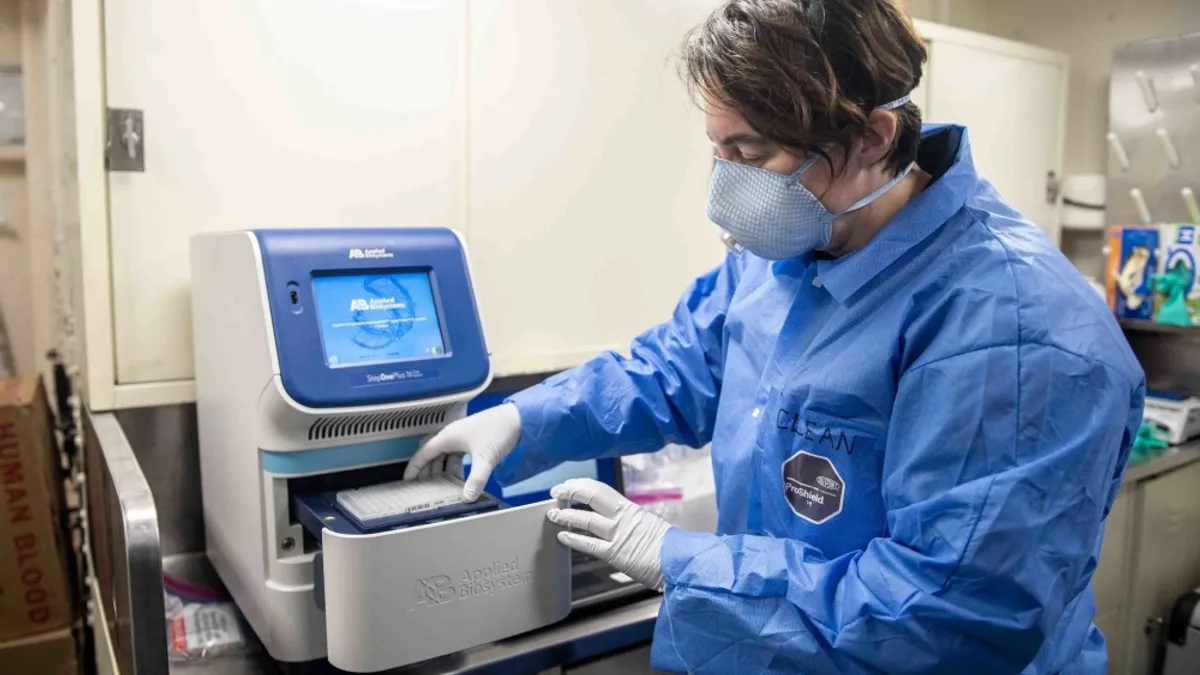Dive Brief:
-
CMS issued guidance Saturday ensuring people with private health insurance can get COVID-19 tests and related services at no cost, implementing parts of two recently enacted pieces of coronavirus legislation designed to free people from copays and coinsurance.
-
It comes against a backdrop of complaints from clinical labs, which have accused Congress of failing to provide money for the “free testing” they are providing and say they'll be left with higher costs inhibiting their ability to respond to the pandemic.
- While both laws set out the broad requirements for no-cost testing, the acts lack details about how the legislation will be implemented. The guidance published by CMS this weekend, which takes the form of a question and answer document, is intended to fill in the gaps.
Dive Insight:
The importance of testing to the management of the coronavirus outbreak, particularly as states try to start lifting lockdowns, makes it critical that people are able to access diagnostic services. Costs borne by the privately insured could deter those people from seeking testing, making it harder for states to stop chains of transmission and thereby increasing the likelihood of a second surge of cases.
Congress recognized that potential problem. The Families First Coronavirus Response Act (FFCRA) states organizations that offer group or individual health insurance cannot impose cost-sharing requirements on people who seek COVID-19 tests during the pandemic. The subsequent Coronavirus Aid, Relief, and Economic Security (CARES) Act expanded the list of tests and related services covered by the prohibition on cost sharing.
The American Clinical Laboratory Association, which represents big players like Quest, LabCorp and Mayo Clinic Laboratories, previously argued new mandates require them to eat the costs.
"For the third time, Congress has failed to provide the necessary funds to support ‘free testing’ for all Americans. Our members remain in an untenable situation, absorbing growing, uncompensated costs for testing specimens with no assurance that they will be appropriately or fairly reimbursed for all the tests they are performing," the organization wrote in a statement late last month.
But the law itself gives the labs rates negotiated before the pandemic or if there wasn't one, "the cash price for such service that is listed by the provider on a public website. The plan or issuer may negotiate a rate with the provider that is lower than the cash price," according to a CMS summary.
Nonetheless, ACLA President Julie Khani told MedTech Dive in a written statement on Monday: “If laboratories do not have the necessary funding to expand capacity, ‘free’ testing is an empty promise. The cost of supplies are increasing, and at the same time, laboratories are seeing a substantial decline in non-COVID-19 testing, as patient visits to physicians plummet and elective surgeries, screenings and routine care services are postponed."
Khani added that "policymakers are quick to agree that more testing is needed, but have failed to provide any dedicated funding to support the labs performing COVID-19 testing" and "as new antibody tests become available in the coming days, we cannot afford to repeat the same mistake."
The CMS guidance clarifies that the definition of in vitro diagnostic tests used in FFCRA and CARES covers methods for detecting antibodies against SARS-CoV-2, the coronavirus that causes COVID-19. That clarification means the full battery of COVID-19 tests, spanning ways to detect SARS-CoV-2 to tools for showing if a person was previously infected, are covered by the no-cost requirement. By testing for antibodies, some public health officials hope to let previously infected people get back to work.
Yet, while people should now be able to access all types of COVID-19 tests without incurring direct costs, the reliability of some of those diagnostics remains in question. The accuracy of antibody tests is a particular concern.
FDA awarded emergency use authorization to Cellex’s antibody test at the start of the month, and other companies including BD are using emergency FDA guidance to provide similar tests. However, the experience of countries such as the U.K., which saw a problematically high rate of false negatives and positives in tests it sourced from nine companies, have raised concerns the diagnostics could lead someone to erroneously think they are immune to SARS-CoV-2.
The situation is complicated by expectations that only a small proportion of the population will have been infected by the time states start lifting lockdown restrictions. If, for example, 2% of people have been infected, the false positive paradox means a test with a specificity of around 95% would deliver more false positives than true positives. The proportion of false positives will decrease if the test gets more sensitive or the percentage of people previously infected with the virus increases.












